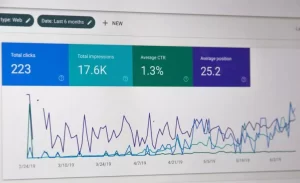Search Engine Optimization (SEO) remains a crucial aspect for the success of an online business. However, there are certain SEO techniques that, instead of bringing benefits, can negatively impact a site’s positioning and online reputation. In this article, we will explore the SEO techniques that should be avoided to ensure a sustainable and effective SEO strategy.
Keyword Stuffing
One of the traditional techniques historically employed in SEO is known as “keyword stuffing.” This approach entails the excessive insertion of keywords within the content of a webpage with the aim of manipulating search engine rankings. Such practices not only violate search engine rules but can also make the content appear unprofessional and affect the user experience.
Low-Quality Backlinks
Acquiring an excessive number of backlinks of low quality or participating in link schemes can have substantial and enduring consequences on the long-term search engine rankings of a website. Search engines prioritize quality over quantity when it comes to backlinks, and link-building practices should focus on relevance and authority.
Plagiarized Content
Employing content that is either duplicated or plagiarized can have adverse effects on the search engine optimization of a website. Search engines aim to provide original and relevant results to users, and duplicate content is viewed critically. Investing in creating unique and high-quality content is essential for long-lasting results.
Unjustified Redirects
Redirects, when used judiciously, can bring significant benefits. However, excessive or unjustified use can disappoint users and negatively impact SEO performance. Too many redirects can lead to delays in page loading and a confusing browsing experience. This not only deteriorates the user experience but can also influence the site’s ranking in search results. Therefore, it is essential to carefully manage and avoid the abuse of redirects to ensure smooth and efficient navigation while maintaining the integrity of the site’s SEO.
Neglecting Mobile-First Approach
Insufficient attention to optimizing for mobile users can have significant repercussions on the overall efficiency and performance of an SEO strategy. By neglecting adaptation to the specific needs of mobile users, a site risks losing visibility and exposing itself to a decline in search engine rankings. It is imperative to properly integrate mobile optimization into the overall SEO strategy, ensuring that the site is ready to provide a quality experience on mobile devices. This contributes to maintaining or improving positions in search results and increasing user satisfaction.
Excessive Use of Tags
Excessive use of tags can create confusion for both search engines and users, potentially depreciating the SEO value of the content. Emphasis is placed on the need for a coherent and well-organized content structure based on relevant keywords. It should be logically arranged, contributing to a clearer browsing experience and a more precise understanding of the provided information. Careful tag selection and implementation of a cohesive structure are essential for SEO success.
Ignoring Analytics and Continuous Improvement
SEO is an ever-evolving practice, and ignoring analytics and a lack of continuous adaptation can have negative consequences for search engine rankings. It is essential to stay aware of industry changes and adjust SEO strategies accordingly to maintain or improve online visibility. Monitoring site performance and adjusting the SEO strategy based on changes in search engine algorithms are key to success in a dynamic and ever-changing digital environment.
To ensure long-lasting results in search engine optimization, it is advisable to avoid unethical practices and focus on implementing sustainable strategies. These strategies should not only strictly adhere to search engine guidelines but also provide authentic value to users, creating a positive and relevant online experience. By orienting towards ethical and adaptable approaches, you will contribute to building a robust online presence in harmony with the changes in the digital landscape.
Learn about How Advertorials Can Improve SEO Strategies and Drive Increased Traffic
Follow us on social media:
Instagram: https://www.instagram.com/securemenow/
Facebook: https://www.facebook.com/securmenow
We offer SEO and Web Design services. Contact us







